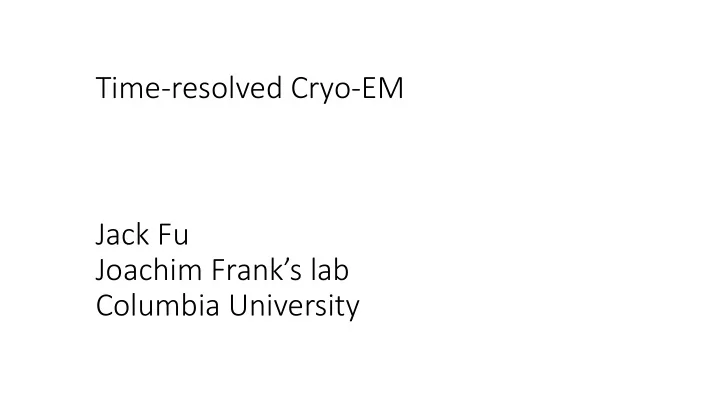

Time-resolved Cryo-EM Jack Fu Joachim Frank’s lab Columbia University
Questions to address? • How can time-resolved cryo-EM help you in your research? • We need your help. • What are the obstacles to success? • There are a lot of issues in time-resolved Cryo-EM method.
Time-resolved cryo-electron microscopy • Time-resolved cryo-electron microscopy (cryo-EM) combines the known advantages of single-particle cryo-EM in visualizing molecular structure with the ability to dissect the time progress of a reaction between molecules in vitro.
Time-resolved cryo-electron microscopy • Time-resolved cryo-electron microscopy (cryo-EM) combines the known advantages of single-particle cryo-EM in visualizing molecular structure with the ability to dissect the time progress of a reaction between molecules in vitro. Molecule A + Molecule B Molecule C Light, pH, ? Intermediate 1 Ionic concentration, (lifetime: min, sec, ms, m s or even shorter) Temperature, Electric Field, Magnetic Field, Mechanical force, Others.
What has been tested?
Acetylcholine receptor Acetylcholine
Limitations in the spraying-freezing method Molecule A + Molecule B Small molecule On Cryo-EM grid + Acetylcholine/ ATP Marker to identify the droplets The mixing is dependent on diffusion 1. slow 2. dependence on molecular weight Our solution is the mixing-spraying-freezing method
Experimental setup – Microfluidic chip
Experimental setup – Mixer performance Flow rate: 1 m L/s Not mixed well Flow rate: 6 m L/s Very well mixed
Experimental setup – Mixer performance Mixing time 0.5 ms Mixing 70S ribosomes and Ferritin molecules
Experimental setup – Reaction time Length of the reaction channels and the flow rate determine the reaction time in the microfluidic chips. Mixing time 0.5 ms Reaction time 4-500 ms
Experimental setup – Plunging and freezing Reaction is stopped by plunging into cryogen. Cryogen Mixing time 0.5 ms Reaction time 4-500 ms Plunging time 18 ms
Limitation • 1. How to get right ice thickness?
Blotting grid Spraying grid
Quantifoil R1.2/1.3 400 mesh
Blotting grid Spraying grid
Spraying grid droplet Holey carbon film Grid Bar Grid Bar
Spraying grid droplet Holey carbon film Grid Bar Grid Bar
Spraying grid droplet Holey carbon film Grid Bar Grid Bar
(A and B) The ice thickness is different from the leading to the trailing side of each hole (blue arrows), which is different from grids obtained by the blotting method. (C and D) The ice is thinner on one side than on the other side as indicated by the different lengths of the tunnels drilled on the two sides. The thicker ice
Data collection
Mean droplet size – flow rate ratio between liquid and gas • Diameter: 36.2 to 4.4 μm ( Volume : 24.4 pL - 0.044 pL ) Gas pressure: 16 psi to 48 psi Where m is the mass flow rate, and subscripts g and l denote gas and liquid. Suppose that the solution sprayed is water, the viscosity μ , surface tension σ , density ρ are 0.89 × 10−3 Pa·s, 0.072 N/m, 1 × 103 kg/m3, respectively.
Measurements of Ice Thickness of Droplets Sprayed on the EM Grid
Pie charts illustrating the droplet siz ize dis istribution under four dif ifferent sprayin ing conditio ions.
3.0-Å Resolution Structure of Apoferritin Obtained by Spraying with the Microsprayer
360-kDa membrane protein, AcrB 3.7 Å 8.0 Å 5.5 Å 3.0 Å In preparation
3D EM-density (3.2 Å) of AcrB in Native Cell Membrane Nanoparticle Submitted
3D EM-density: Native Cell Membrane Bilayer PE Submitted
Lipid Belt in Sliced View and Hexagonal Pattern of Lipid Arrangement Submitted
Overview of translation TM Schmeing & V Ramakrishnan Nature 000 , 1-9 (2009) doi:10.1038/nature08403
The recycling process
Next steps • 1. General application • 2. Nano-fluidic system (less sample consumption) • 3. Sub-millisecond system • (mixing time < 50 m s, freezing time < 100 m s)
Energy filter 20 eV (red) vs no slit (blue) High frequency SSNR (4-10 A) Low frequency SSNR (20-200 A)
Frank nk Lab Tea eam Ming Sun Sandip Kaledhonkar Prof. Joachim Frank Bo Chen Ehren enberg Lab ab Gonzalez Lab Mans Anneli Ruben Kelvin 3D sprayer Microfluidic device with PDMS New Time-Resolved Machine Dr. Qiao Lin Yuan Jia Xiangsong Feng Prof. Howard D. White Dept. of Mechanical Engineering Eastern Virginia Medical School Columbia University
References Key intermediates in ribosome recycling visualized by time-resolved cryoelectron microscopy Z Fu, S Kaledhonkar, A Borg, M Sun, B Chen… - Structure, 2016 A Fast and Effective Microfluidic Spraying-Plunging Method for High-Resolution Single-Particle Cryo-EM X Feng*, Z Fu*, S Kaledhonkar, Y Jia, B Shah, A Jin… - Structure, 2017 Lipid Bilayer Structure in Native Cell Membrane Nanoparticles of Multidrug Exporter AcrB Qiu W*, Z Fu*, Xu G, … - Submitted
Recommend
More recommend